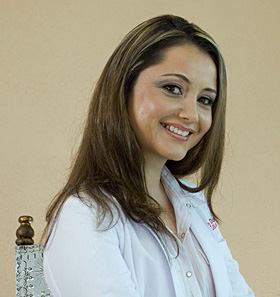
|  |  |  Health & Beauty Health & Beauty  
Interview with Vallarta Psychiatrist Dra. Adi Dominguez
 Pamela Thompson - HealthCareResourcesPV.com Pamela Thompson - HealthCareResourcesPV.com
October 23, 2010


| | To arrange a consultation with Dra. Adi Dominguez, send an email to info(at)healthcareresourcespv.com, or call (322) 223-0878. (photo by Josef Kandoll) |  |
We all seem to be touched by either a family member or friend who suffers from Alzheimer’s Disease. Though the research continues, to date, there is no "cure." We interviewed Dra. Adi Dominguez, a local psychiatrist who specializes in geriatrics about any pre-disease testing and prevention.

HealthCare Resources (HCR): Is there an exam that can be performed to predict if a person will have the diagnosis of Alzheimer’s?

Dra. Adi: The Addenbroke cognitive exam or "ACE-R" is a brief, cognitive test for dementia screening. It was developed in Addenbrooke Hospital in the UK. It does a better job at detecting early signs of Alzheimer’s than previously available tests.

HCR: What does it involve?

Dra. Adi: It tests a wide range of cognitive functions such as orientation, attention, memory, verbal fluency, language and visuo-spatial abilities. It is reliable, sensitive and specific. It must be administered by a geriatric or general psychiatrist with experience in differentiating sub-types of dementia including Alzheimer’s, fronto-temporal dementia, Lewy body dementia, vascular dementia and mild cognitive decline. It is even sensitive to mild or early signs of Alzheimer’s.

HCR: Is it accurate?

Dra. Adi: The test detects 93% of Alzheimer’s compared with 52% detected by the Folstein MMSE which, until now had been the most used dementia screening tool.

HCR: What is the cost, locally?

Dra. Adi: $600 pesos for both the testing and consultation fee.

HCR: Are there any medications that can be taken to prevent Alzheimer’s Disease?

Dra. Adi: Currently there are no meds to prevent or cure Alzheimer’s. Treatment involves medications that delay the progression of the disease and target symptom management. Worldwide, researchers are working on medications to treat the underlying disease and reverse brain cell damage.

HCR: Are there any other activities or exercises that can be done to prevent Alzheimer’s?

Dra. Adi: There are lifestyle changes that can significantly reduce the risk. Smoking after age 65 can increase your risk by 79%. Diabetics are twice as likely to develop Alzheimer’s. Obesity makes it 3.5 times more likely to experience the disease. Chronic stress can quadruple your risk. Heart health and lack of sleep have also been linked to Alzheimer’s.

So, if you stop smoking, lose weight, have good nutrition, introduce antioxidants into your health regimen, begin an exercise program, keep your cholesterol in check and successfully manage the stress in your life, you can reduce your chances of suffering from Alzheimer’s even when we cannot do anything to change aging and genetic risk.

HCR: What activities do you suggest to keep our minds "clear and bright" as we age?

Dra. Adi: People who participate in mentally challenging activities such as reading, doing Sodoku, crossword puzzles, play chess or mah jong help their brains to become more adaptable and flexible in some areas of mental function, so it can compensate for decline in other areas.

Life long learning establishes a "cognitive reserve" which is the brain’s ability to operate effectively even when some function is disrupted. This is different from regular mental activities in that the effort involved is towards acquiring knowledge and skills that are completely new.

The best examples are taking up a musical instrument or learning a new language. Social engagement, having many friends and acquaintances is associated with decreased risk of cognitive decline. Do volunteer work, join a book club and even attending religious services.

HCR: Thank you! Any last piece of advice?

Dra. Adi: Early detection and treatment of Alzheimer’s can buy people months, or even years that they would not have had otherwise.

Dra. Adi Dominguez is a 100% bi-lingual psychiatrist specializing in all types of mental health. As well, she currently heads up the detox program at Hospital Medasist. Watch for upcoming programs and talks that she will be doing in conjunction with HealthCare Resources. For more information, please contact Pamela(at)healthcareresourcespv.com.
 Pamela Thompson has lived and worked in Puerto Vallarta for over 17 years, 10 of them in health care. Pamela now leads HealthCare Resources Puerto Vallarta, a local healthcare resource network. Her years of experience and expertise are available to you by emailing your questions to pamela(at)healthcareresourcespv.com or by visiting HealthCareResourcesPV.com. Pamela Thompson has lived and worked in Puerto Vallarta for over 17 years, 10 of them in health care. Pamela now leads HealthCare Resources Puerto Vallarta, a local healthcare resource network. Her years of experience and expertise are available to you by emailing your questions to pamela(at)healthcareresourcespv.com or by visiting HealthCareResourcesPV.com.

Click HERE to learn more about the health and well-being services offered by HealthCare Resources Puerto Vallarta. |

 |
|  |



